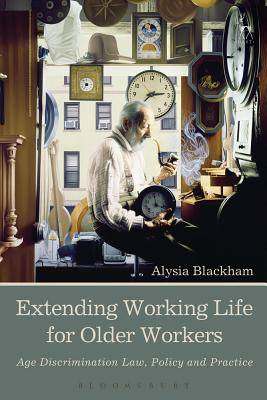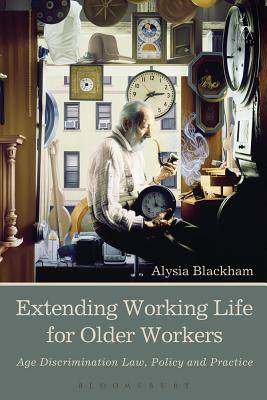
Bedankt voor het vertrouwen het afgelopen jaar! Om jou te bedanken bieden we GRATIS verzending (in België) aan op alles gedurende de hele maand januari.
- Afhalen na 1 uur in een winkel met voorraad
- In januari gratis thuislevering in België
- Ruim aanbod met 7 miljoen producten
Bedankt voor het vertrouwen het afgelopen jaar! Om jou te bedanken bieden we GRATIS verzending (in België) aan op alles gedurende de hele maand januari.
- Afhalen na 1 uur in een winkel met voorraad
- In januari gratis thuislevering in België
- Ruim aanbod met 7 miljoen producten
Zoeken
Extending Working Life for Older Workers
Age Discrimination Law, Policy and Practice
Alysia Blackham
Paperback | Engels
€ 79,95
+ 159 punten
Uitvoering
Omschrijving
The UK population is ageing rapidly. While age discrimination laws are seen as having broad potential to address the 'ageing challenge' and achieve instrumental and intrinsic objectives in the context of employment, it is unclear what impact they are having in practice. This monograph addresses two overarching research questions in the employment field: How are UK age discrimination laws operating in practice? How (if at all) could UK age discrimination laws be improved? A reflexive law theoretical standpoint is employed to investigate these issues, applying a mixed methods research design that engages qualitative, quantitative, doctrinal and comparative elements. This book demonstrates the substantial limitations of the Equality Act 2010 (UK) for achieving instrumental and intrinsic objectives. Drawing on qualitative expert interviews, statistical analysis and organisational case studies, it illustrates the failure of age discrimination laws to achieve attitudinal change in the UK, and reveals the limited prevalence of proactive measures to support older workers. Integrating doctrinal analysis, comparative analysis of Finnish law, and the Delphi method, it proposes targeted legal and policy changes to address demographic change, and offers an agenda for reform that may increase the impact of age discrimination laws, and enable them to respond effectively to demographic ageing.
Runner up of the 2017 SLS Peter Birks Prize for Outstanding Legal Scholarship!
Runner up of the 2017 SLS Peter Birks Prize for Outstanding Legal Scholarship!
Specificaties
Betrokkenen
- Auteur(s):
- Uitgeverij:
Inhoud
- Aantal bladzijden:
- 256
- Taal:
- Engels
Eigenschappen
- Productcode (EAN):
- 9781509927883
- Verschijningsdatum:
- 21/03/2019
- Uitvoering:
- Paperback
- Formaat:
- Trade paperback (VS)
- Afmetingen:
- 155 mm x 231 mm
- Gewicht:
- 430 g

Alleen bij Standaard Boekhandel
+ 159 punten op je klantenkaart van Standaard Boekhandel
Beoordelingen
We publiceren alleen reviews die voldoen aan de voorwaarden voor reviews. Bekijk onze voorwaarden voor reviews.









